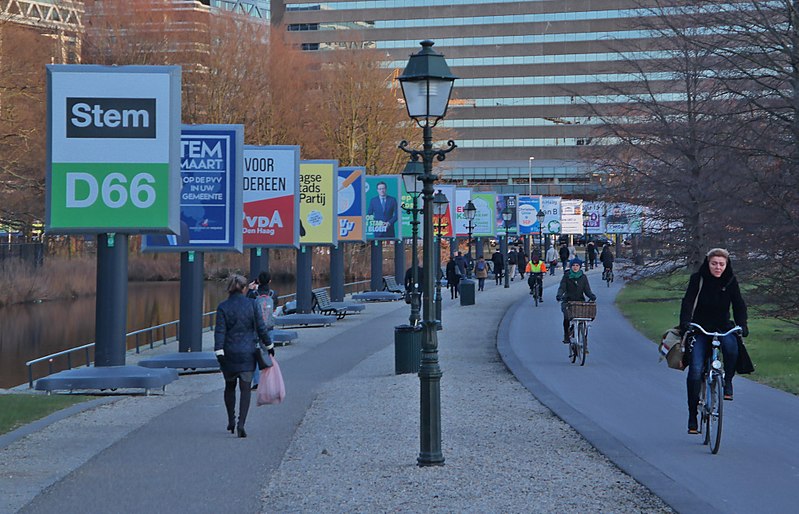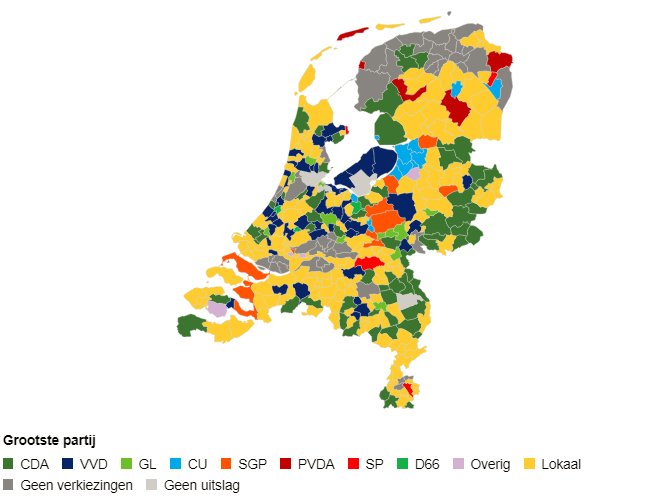Municipal elections were held in the Netherlands on 21 March 2018
Municipal elections were held in the Netherlands on 21 March. During the election day, citizens had to choose their municipal council for the next four years. The elections coincided with the popular referendum on the law of intelligence and security services.
Municipal councils are elected using party-list proportional representation. The number of seats depends on the population of the municipality, ranging from nine seats for municipalities with a population below 3,000, to 45 seats for municipalities with a population over 200,000.

All citizens of the Netherlands or the EU from the age of 18, and citizens from outside the EU who have been residing legally in the Netherlands for more than 5 years, had the right to vote in these elections.
Turnout has gone up in all but one of the 10 bigger. Only in The Hague is turnover down on 2014.
Amsterdam
GroenLinks emerged as the big winner in Amsterdam in Wednesday's local elections, boosting its share of the city council vote from six to 10 seats – according to preliminary results. D66, who overtook the PvdA four years ago, slumped from 14 to eight.
More information on the results
Amsterdam Local Elections information
Rotterdam
Leefbaar Rotterdam, the right-wing populist party currently working with D66 and the Christian Democrats in the port city's coalition, managed to retain its leading position in Wednesday's vote. Despite losing two seats, Leefbaar's total of 11 is more than double that of its nearest rivals. Party leader Joost Eerdmans said he aimed to create a broad coalition that did justice to the results and was looking into an alliance with the VVD, D66, PvdA and GroenLinks. Geert Wilders' PVV, challenging Leefbaar on its home turf, only managed to win two seats. Islamic party NIDA retained its two while newcomer Denk took 3, showing the strength of the immigrant vote.
Turnout was low at 46.8% but up on 2014's 45.1%.
Leefbaar 11 (13) VVD 5 (3) PvdA 5 (8) D66 5 (6) GroenLinks 5 (2) Denk 3 NIDA 2 (2) SP 2 (5) CDA 2 (3) PVV 2 PvdD 1 (1) 50Plus 1 CU/SGP 1 (1)
Eindhoven
The VVD and GroenLinks are level pegging in Eindhoven, while the PvdA, in 2014 the biggest city, is now in joint second place with D66. With several local parties also winning or holding seats, there will be 13 parties in the city council.
Turnout, at 46.4% is the lowest in our 10 focus cities, but that is up on 2014 when just 44.7% of voters cast their ballot.
VVD 7 (6) GroenLinks 7 (4) PvdA 8 (6) D66 7 (6) CDA 5 (4) SP 4 (7) Ouderen 2 (5) LPF 2 91) 50Plus 2 Denk 1 Leefbaar 1 (2) CU 1 (1) BRBE 1
Amstelveen
Amstelveen shows a fairly stable result compared with many of the other cities, with the VVD remaining the biggest party and increasing its seats from nine to 10. D66 managed to lose just one seat, to remain on seven.
Turnout 58% (55.4%)
VVD 10 (9) D66 7 (8) GroenLinks 5 (4) Burbel 4 (4) PvdA 3 (3) SP 3 (2) CDA 3 (2) Actief 2 Ouderen 1 (2) CU 1 (1)
Leiden
Leiden's current council coalition spans four parties, from left to right, but GroenLinks has doubled its support from four to eight, clearing the way for a more left-leaning administration. D66 remains the biggest party.
Turnout 57.3% (56.9%)
D66 9 (11) Groenlinks 8 (4) VVD 6 (5) PvdA 4 (5) CDA 3 (4) PvdD 3 (1) SP 3 (5) Parsleut 2 CU 1 (1)

Maastricht
With four parties each on five seats and 13 in the council as a whole, putting together a new coalition in Maastricht will be a jigsaw puzzle. The PVV debuted in the southern Limburg city, but only managed to win two seats.
Turnout is the among the lowest among our 10 focus cities at 48.1%, but up on the 46.9% turnout in 2014.
CDA 5 (5) Senioren 5 (6) GroenLinks 5 (4) D66 5 (5) PvdA 3 (5) VVD 3 (3) SP 5 (3) PVM 3 (3) Moed 2 PVV 2 SAB 1 60Plus 1 LibPart 1 (1)
Utrecht
GroenLinks have overtaken D66 as the biggest party, while the PVV, which had high hopes of doing well, only managed to capture one seat. At least three parties will be needed for a coalition.
Turnout tbc, was 51.3%
GroenLinks 12 (9) D66 10 (13) VVD 6 (5) PvdA 3 (5) CDA 2 (3) PvdD 2 (1) Denk 2 SP 2 (4) CU 2 (2) Student 2 (1) PVV 1 Stadsb 1 (2)
Haarlem
GroenLinks has overtaken D66 to become the biggest party in Haarlem, which is one of the few places where support for the Labour party (PvdA) has held up. The current coalition is made up of D66, PvdA, GroenLinks and CDA.
Turnout 55.4% (52.7%)
Groenlinks 8 (5) PvdA 6 (6) VVD 5 (5) D66 5 (7) CDA 4 (4) SP 4 (3) Trots 2 (1) Ouderen 2 (2) Hart voor Haarlem 1 (1) Jouw Haarlem 1 (1) CU 1 (1) Actie 1 (2)
Delft
The university town has its own student party, STIP, which this year has increased its share of the vote to win six seats. GroenLinks, with seven seats, is the biggest party after support for D66 fell sharply.
Turnout 56.1% (55.6%)
GroenLinks 7 (4) STIP 6 (4) D66 5 (8) Indep Delft 5 (3) VVD 3 (3) CDA 3 (3) SP 3 (3) PvdA 3 (4) CU 2 (2) Stadsbel 2 (2)
Information from DutchNews.nl
More information:
https://english.kiesraad.nl/elections/elections-of-the-municipal-council